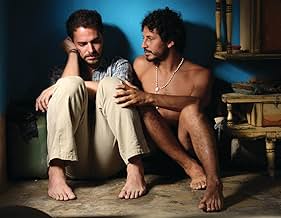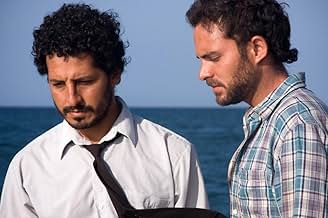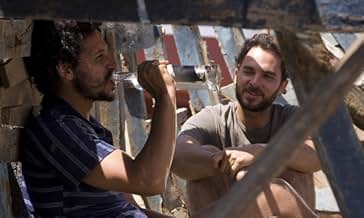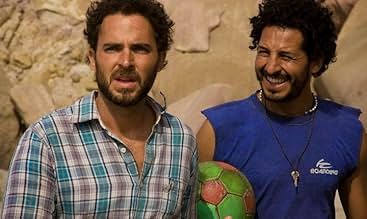IMDb RATING
7.7/10
7.3K
YOUR RATING
An unusual ghost story set on the Peruvian seaside; a married fisherman struggles to reconcile his devotion to his male lover within his town's rigid traditions.An unusual ghost story set on the Peruvian seaside; a married fisherman struggles to reconcile his devotion to his male lover within his town's rigid traditions.An unusual ghost story set on the Peruvian seaside; a married fisherman struggles to reconcile his devotion to his male lover within his town's rigid traditions.
- Awards
- 13 wins & 13 nominations
Humberto Cavero
- Padre Juan
- (as Julio Humberto Cavero)
Liliana Alegría
- Carlota
- (as Liliana Alegria Saavedra)
Tomas Fernandez
- Sabino
- (as Tomás Fernández)
- Director
- Writer
- All cast & crew
- Production, box office & more at IMDbPro
Storyline
Did you know
- TriviaAlthough both main characters are Peruvian, the actors who play them are not. Cristian Mercado (the Fisherman) is Bolivian and Manolo Cardona (the Photographer) is Colombian.
- ConnectionsFeatures Direito de Amar (1987)
Featured review
One of the best new films exploring gay male identity, love and relationships, and likely will be a worthy addition to many personal "favorite gay films" lists, although the fact that the film is set in a town, and to some extent a culture, where, at least for a large part of the story, many in the town have not yet evolved in their views of LGBT people and issues, created some (ultimate unnecessary) anxiety for me early in the film, and at parts throughout, as to whether the film would be a throwback to older, more stereotyped and limited representations and stories of gay life, although those anxieties were not only relieved by the end of the film, but, as I suggested, the film is an extremely valuable addition to the new wave of gay cinema.
The writer, director, casting director and cast, cinematographer, set designer and other members of the film-making team also do a great job exploring rural, small town life, with its traditions (religious and otherwise...) superstitions, and class differences, and the interplay among the individuals, families and community who inhabit the town, along with the welcome (or rejection...) given to a stranger who comes there, and who many perceive as a threat to the social fabric of the town, and the support (or lack of it...) the townspeople and characters show to each other, ultimately examining the struggle between bigotry and ignorance, on the one hand, and the struggle to overcome that bigotry and ignorance, and replace it with support, respect and love on the other. Most of the townspeople are not financially well-off, but make just enough to get by, working in occupations connected to fishing and the sea, and the way they relate, individually and as a community, to each other (and to themselves, in regard to what is the true definition of a man, of an individual's self-respect) in light of a newcomer who is more financially well-off, and his artistic and suspected sexual/relationship interests, are additional themes of the film, which play out so well in a beautiful, interesting and captivating way, often evoking strong emotions, and at times offering an inspiring catharsis (and perhaps a few tears, in reaction to some sadness, and much beauty.)
And there are many other highlights of the film beyond all that, including the amazingly beautiful setting, in a rural, seaside Peruvian village, the cinematography, musical score, performances, plot twists and turns, the mix of fantasy and reality (and moments where it's unclear to what extent fantasy exists as an aspect of the story's reality.) This is a truly unique and creative film, and one of the most rewarding experiences I've had at a feature film in a long time.
The writer, director, casting director and cast, cinematographer, set designer and other members of the film-making team also do a great job exploring rural, small town life, with its traditions (religious and otherwise...) superstitions, and class differences, and the interplay among the individuals, families and community who inhabit the town, along with the welcome (or rejection...) given to a stranger who comes there, and who many perceive as a threat to the social fabric of the town, and the support (or lack of it...) the townspeople and characters show to each other, ultimately examining the struggle between bigotry and ignorance, on the one hand, and the struggle to overcome that bigotry and ignorance, and replace it with support, respect and love on the other. Most of the townspeople are not financially well-off, but make just enough to get by, working in occupations connected to fishing and the sea, and the way they relate, individually and as a community, to each other (and to themselves, in regard to what is the true definition of a man, of an individual's self-respect) in light of a newcomer who is more financially well-off, and his artistic and suspected sexual/relationship interests, are additional themes of the film, which play out so well in a beautiful, interesting and captivating way, often evoking strong emotions, and at times offering an inspiring catharsis (and perhaps a few tears, in reaction to some sadness, and much beauty.)
And there are many other highlights of the film beyond all that, including the amazingly beautiful setting, in a rural, seaside Peruvian village, the cinematography, musical score, performances, plot twists and turns, the mix of fantasy and reality (and moments where it's unclear to what extent fantasy exists as an aspect of the story's reality.) This is a truly unique and creative film, and one of the most rewarding experiences I've had at a feature film in a long time.
- How long is Undertow?Powered by Alexa
Details
Box office
- Gross US & Canada
- $108,620
- Opening weekend US & Canada
- $6,749
- Sep 19, 2010
- Gross worldwide
- $602,059
Contribute to this page
Suggest an edit or add missing content























